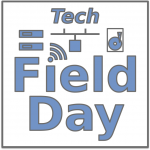Some days ago I was invited to as a delegate at the first edition of Data Field Day (#DFD1) event, scheduled in May 13–15, 2015 in California (Silicon Valley and San Francisco).
 Data Field Day event purpose was to cover different topics from others Technical Field Day events: from big data to analytics to hyperscale architecture and cloud security, and all waves of innovations that are transforming the IT. A new format for some growing trends, including micro-services, mobile and the Internet-connected world.
Data Field Day event purpose was to cover different topics from others Technical Field Day events: from big data to analytics to hyperscale architecture and cloud security, and all waves of innovations that are transforming the IT. A new format for some growing trends, including micro-services, mobile and the Internet-connected world.
But if you have seens some of the presentation video you may have some doubts if it was more a data (at high level) related event or a storage event (for some aspects it was also a Storage Field Day extra #SFDx).
First issue cames from the name: data means a lot of things, but for this kind of event must mean a set of values of qualitative or quantitative variables; restated, pieces of data are individual pieces of information. But data exist at different level, so it’s clear that (for example) for a storage company data mean how do you storage and manage them… not necessary how a user can handle them or can gain value from them. By having 3 companies that are mainly storage vendor, this type of polarization was inevitable.
But this is not necessary so bad, unless you can’t explain the real value and the user cases of your solution. And this was probably the biggest issues in some presentation.
Other delegates have already explained it and you can read more in those two posts:
But considering the purpose the Data Field Day, I think that still we were on topics (in most cases).
Let’s start from Big Data: a broad term for data sets so large or complex that traditional data processing applications are inadequate. Challenges include analysis, capture, data curation, search, sharing, storage, transfer, visualization, and information privacy. The term often refers simply to the use of predictive analytics or other certain advanced methods to extract value from data, and seldom to a particular size of data set. Accuracy in big data may lead to more confident decision making. And better decisions can mean greater operational efficiency, cost reductions and reduced risk.
Considering the type of data, storage of course make sense and can be relevent on how store and access those kind of data (but of course I agree that must be more on how rather then on how, otherwise it’s just a Storage Field Day presentation).

Data are growing faster, and this example was in 2007 without considering the recent grow of mobile devices and the Internet of Things (IoT) trends.
Size matters! And all these technologies are all thought up to solve problems at a big scale:
- Object storage -> storing huge amounts of unstructured data
- Big Data (Analytics) -> analyzing huge amounts of data
- Openstack (and cloud management platforms in general) -> managing huge pools of compute, networking and storage resources.
The other two DFD topics, analytics and hyper scale, still match the storage world… and both are relevent trends!
But analytics (and data mining and in general how gain value from data) are also a more general aspect that could be analyzed independently by the storage (and compute) aspects.
And what about the remaining topics? Cloud security, including micro-services, mobile and the Internet-connected world were all almost missing the first DFD but honestly I see those more as separated topics that can be covered by a specific Field Day format, unless the focus is on how use those technologies to implement specific solutions based on the collected data (in the wireless world, just to make an example, there are really interesting cases).
Anyway considering that was the first DFD I have to admit that it’s a great starting point: the other delegates were really great and with impressing skills in the “data” area and this is the best way to start. Presentation can be improved and recalibrated to cover the right topics… but having the right skills and knowledge on the attendee part it’s more important (and not so easy).
Of course also having more companies in the specific data, big data, analytics, … world could be better… but this can be easiest improved in future editions.
Changing the name of the event can also be an option (data is too much generic, but formally is corrected), but I think that could be better just declare better the topics that are (and should be) covered by this kind of event.
Disclaimer: I’ve been invited to this event by Gestalt IT and they will paid for accommodation and travels, but I’m not compensated for my time and I’m not obliged to blog. Furthermore, the content is not reviewed, approved or published by any other person than me.











